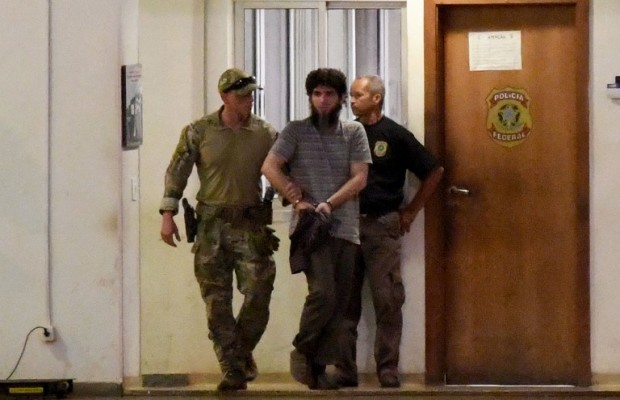
An alleged terrorist walks escorted by police at the Brazilian Federal Police hangar at the airport in Brasilia on July 21, 2016.
Brazilian police have arrested 10 members of an “amateur” would-be terrorist group that expressed loyalty to the Islamic State organization and was targeting the upcoming Olympics, officials said. / AFP PHOTO / EVARISTO SA
Brazilian officials announced a new arrest on terrorism charges Thursday, saying that a man living in Rio de Janeiro state had sworn allegiance to the Islamic State group and had been in Syria.
The man allegedly had links to terrorist organizations at least as far back as 2014 when Brazil hosted the football World Cup, said Justice Minister Alexandre de Moraes.
Despite the arrest, which followed 12 others last week, de Moraes said “there is still a very minimal chance of a terrorist attack.”
Meanwhile, Rio’s top security official vowed to review security for the Olympic torch after rioting protesters blocked the relay ceremony and apparently extinguished the flame.
The violent clashes late Wednesday in Angra dos Reis, a coastal resort south of Rio, cast a shadow over final preparations for South America’s first Olympics, which start August 5.
In another worry for Olympic organizers, Rio metro employees threatened Thursday to go on strike on the eve of the Games if they do not get a nearly 10 percent salary increase, raising the possibility of transport chaos for some 500,000 tourists expected to attend.
‘Terrorism’ charges
Officials said that the terrorism suspect, a Brazilian citizen, was arrested Wednesday at his home in Nova Iguacu, in Rio de Janeiro state.
The justice department said the indictment against Chaer Kalaun, a Brazilian of Lebanese descent, was sealed, but had been filed under anti-terrorism laws.
Separately, the federal police said a 34-year-old man was being investigated after he “promoted a terrorist organization on the Internet.” He also had a prior detention for possession of weapons.
De Moraes said the suspect “was involved, had a link with terrorists back as far as the World Cup.”
“We carried on investigating him and he left Brazil. He was in Syria and returned to Brazil and swore loyalty to the Islamic State” group.
The man’s lawyer, Edson Ferreira, said the allegations lacked substance.
“There’s nothing more than suspicions that he put posts on Facebook,” the lawyer said.
“He did not pledge allegiance, he was not recruiting, or bringing people or collaborating or encouraging any projects of the Islamic State,” he said.
Ferreira said his client is a Muslim and lived in Lebanon when he was an adolescent.
The arrest came a week after the 12 other Brazilian men were arrested in an unrelated incident for allegedly trying to form a terrorism cell. Officials downplayed the seriousness of the group, calling them “amateur” and “disorganized.”
Tear gas
Rio de Janeiro state security secretary Jose Mariano Beltrame said that policing during the relay of the torch — which will have visited more than 300 Brazilian cities by the time of the opening ceremony in Rio’s Maracana stadium — needs improving.
“There has never been a problem,” he was quoted as saying by G1 news site. “Yesterday there was one. This needs to be reevaluated and we will be paying more attention to this question.”
“Extinguishing the torch is a crime,” he warned.
The crowd, protesting a lack of public transport and the late payment of salaries by the nearly bankrupt Rio state, attacked the procession in Angra dos Reis before being driven off by police using tear gas and rubber bullets.
In footage of the clashes shared online and on Globo television, someone can be heard shouting triumphantly: “The torch has been put out!” as the torch bearer, carrying an unlit torch, is hustled into the safety of a bus.
The Rio organizing committee said in a statement that the torch relay “had to be temporarily interrupted.”
Athletes arrive, controversies mount
There was better news for Rio organizers in the arrival overnight of Jamaican sprinting superstar Usain Bolt, who hopes to defend his multiple gold medals.
Wearing a black tracksuit with white stripes, sunglasses and headphones, Bolt was in a hurry to leave the airport. “I didn’t sleep on the flight,” he told a welcoming committee of journalists and officials.
A more controversial set of arrivals were expected later in the day, with some 70 Russian athletes due to arrive in the early evening, their team slashed by bans in a scandal over state-sponsored doping.
Rio organizers were also still racing to complete emergency repairs to the athletes’ Village, where some 19,000 team members will live.
Half of the buildings had problems ranging from blocked toilets to faulty wiring when teams began moving in over the weekend.
Although these glitches were expected to be ironed out by the end of Thursday, new controversy was brewing over allegations by government labor inspectors that the approximately 600 workers are being made to work nearly around the clock without legal contracts.